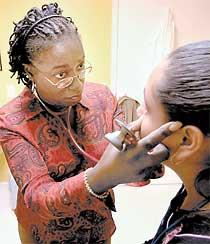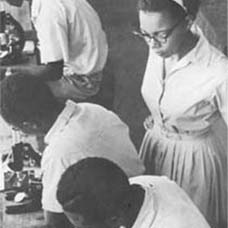
Glenda Watson-Coly, who holds undergraduate and masters degrees in public health from Rutgers University and a masters in nursing from Case Western Reserve University, has seen poverty up close during two tours with the Peace Corps in Kenya and Senegal
Fighting a two-front war
‘You can’t separate the medical from the social,’ says nurse who treats poor, sick kids
By CAROLYN CLICK
Staff Writer
Four decades ago, Glenda Watson-Coly likely would have been on the front lines of Sen. Fritz Hollings war on hunger.
Today, she’s fighting the war on fat, diabetes and hypertension in the midst of generational poverty that stuns her in its pervasiveness.
“It’s like quicksand,” said Watson-Coly, 47, a nurse practitioner who tends students in three of the four Jasper County public schools.
She is caring for more children who are overweight, who are diabetic, who suffer from high blood pressure. Sometimes the obesity masks other problems, including physical and sexual abuse, and parental neglect.
“You can’t separate the medical from the social,” said Watson-Coly, who rotates among West Hardeeville Elementary School, Ridgeland Middle School and Jasper County High School.
Watson-Coley works for the Beaufort-Jasper-Hampton Comprehensive Health Services Inc., a community health agency established in 1970 as a result of the hunger tours Hollings embarked upon in 1968-69.
The federally funded agency is the lifeline for the Lowcountry’s working poor, serving 18,000 patients at eight clinics and eight school-based locations. More than half of the agency’s clients have no health insurance.
Each Wednesday, Watson-Coly and certified nursing assistant Teresita Medrano spend the day in a portable classroom at West Hardeeville.
They work alongside school nurse Patricia Fields, who handles the daily tasks of dispensing medication and bandaging wounds. Medrano translates for Spanish-speaking parents and children.
The medical team has treated everything from routine earaches to sex abuse and “the worst case of diaper rash I have ever seen,” said Watson-Coly. She tries not to dwell on the circumstances of her patient’s lives even as she tries to fix their problems.
“You give them something to hang on to,” she said.
STILL POOR AND HURTING
In the late 1960s, Jasper County and its neighbor Beaufort County were deemed two of the poorest and hungriest places in South Carolina.
Dr. Donald Gatch, a Beaufort physician, had dared to challenge the establishment by insisting that Lowcountry black children were infected by parasitic worms and dying of malnutrition.
In January 1968, at the invitation of a Roman Catholic nun in Charleston, Hollings went to see poverty for himself. He was shocked by what he saw.
After winning reelection that November, including the lion’s share of the minority vote, Hollings embarked on a series of hunger tours that took him to squalid neighborhoods and dingy, rural shacks. He met worm-ridden and hungry children, and adults dulled by years of malnutrition and neglect. At his side was NAACP leader I. DeQuincey Newman, an antagonist from civil rights days, now joined in the same fight.
Before the Senate select Committee on Nutrition and Hunger in February 1969, Hollings testified to what he had seen, not only in the Lowcountry but also in every region of the state.
“Let me categorically state there is hunger in South Carolina,” Hollings, then 47, said. “There is substantial hunger. I have seen it with my own eyes.”
His dramatic testimony included the admission that he had diminished the poverty problem during his 1959-1963 tenure as governor in order to bring industry to the state.
“We didn’t want the vice president of the plant in New York to know the burdens,” he said. “We told him only of the opportunities. You don’t catch industry with worms — maybe fish, but not industry.”
His declarations led to a pilot program to distribute free food stamps in Jasper and neighboring Beaufort County.
Today, Jasper County remains a poor, rural county, tucked into the southwest corner of the state and bordered on two sides by Georgia. About 20 percent of its nearly 21,000 residents remain mired in poverty.
With most of the county’s land in timber and agriculture, the nearest jobs are along the coast in now-booming Beaufort County. Buses leave daily to deliver Jasper County workers to minimum-wage service jobs on Hilton Head Island.
That leaves little time for parents to be with their children, let alone prepare wholesome meals and care for them, said Watson-Coly.
“I don’t want to villify the parents because some of them are just barely hanging in there,” she said. “In the adults, you have the hypertension, the diabetes, the obesity. But behind a whole lot of those people especially those with multiple problems, there’s pain.”
HOPE AND PRAGMATISM
Watson-Coly, who holds undergraduate and masters degrees in public health from Rutgers University and a masters in nursing from Case Western Reserve University, has seen poverty up close during two tours with the Peace Corps in Kenya and Senegal.
But she said the depth of the problems in Jasper is daunting.
The schools have tried to shoulder some of the burden, making sure the children are well-fed during school hours and creating a more welcome environment for parents.
Eighty percent of the public school children in Jasper County receive free or reduced breakfast and lunch.
Starting in January, West Hardeeville principal Sandra Finklea said she will provide free breakfast to every student, in hopes of removing any stigma attached to receiving the benefit.
“We want to have the children fueled for the day,” said Finklea, who was assigned to West Hardeeville by the state Education Department to shore up the academic performance of the school. “I know that some of our children don’t have well-balanced meals except for here.”
Finklea said the emphasis on nutrition has paid off in improved academic scores, but more needs to be done.
“The potential and the ability is there,” she said. “It’s just the obstacles of a small rural area, limited industry, limited businesses, parents working long hours.”
Watson-Coly tempers her hope with frank pragmatism.
“I couldn’t do this 40 hours a week,” she admitted.
After her job is done in Jasper County, she leaves for her home in Beaufort County, which she shares with her cardiologist husband and her daughter.
“But you have to have a certain amount of faith, too, that’s why I am here at this moment.”
Reach Click at (803) 771-8386 or cclick@thestate.com.







